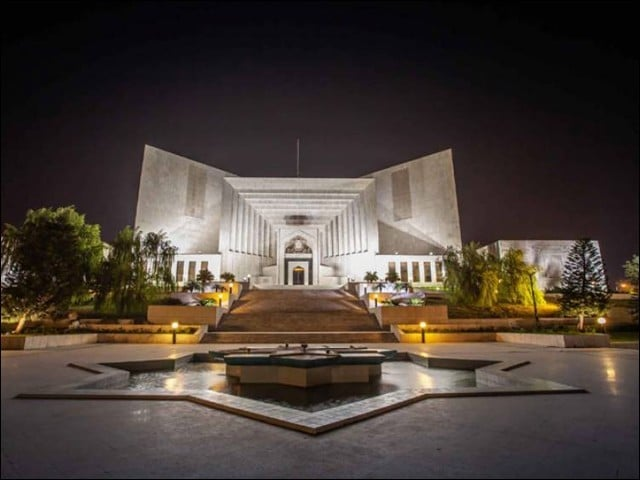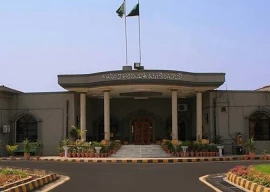
All eyes are on the Supreme Court which is likely to conclude today [Tuesday] its proceedings on petitions seeking annulment of the Supreme Court (Practice and Procedure) Act, 2023, a law that seeks to regulate the chief justice of Pakistan’s (CJP) discretionary powers.
Some lawyers wonder whether the majority of judges on the 15-member full court will acknowledge parliament's competence to make laws regulating the administrative workings of the apex court.
“Parliament's competence to make laws related to the Supreme Court working is a tricky question,” said a senior lawyer, speculating that the majority of judges would accept parliament's competence.
“But it is not clear as to whether the majority of judges will endorse the law to the extent of giving the right of appeal against judgments given under Article 184 (3) of Constitution,” he added.
The majority of judges have already disclosed their mind by giving observations about the "legislative competence” of parliament. Visibly, the judges’ opinion is divided in this case. However, according to a senior lawyer, it will be difficult to predict what will be the final verdict.
Perhaps for the first time, judges who are raising questions about the lack of transparency in the internal workings of the judiciary are in the driver's seat.
Read 'Parliament's intent good', CJP says of law curtailing powers
These judges are also not scared of the fact that if the law is endorsed by the apex court then parliament will make more laws for regulation of the SC's internal working.
That is why Justice Syed Mansoor Ali Shah noted that there is a fear that if the law is endorsed, a floodgate will open. If any law strengthens the judiciary then it will be endorsed but if any law violates the principle of independence of judiciary then it will be struck down, he said.
During the hearing on Monday, it was revealed that CJP Qazi Faez Isa has given up his predecessors’ policy to pass instruction to the SC registrar about the listing of cases before each bench. CJP Isa said he just passed general instructions to the SC registrar about listing of urgent matters.
It has been witnessed that no judge is defending the exercise of jurisdiction under Article 184 (3) by the CJPs since restoration of judiciary in March 2009.
It has been learnt that the record of the Supreme Court Human Rights cell is not available.
Justice Munib Akhtar, however, “expressed serious reservation over the things which are imputed to the retired chief justices” during the hearing.
He also questioned who would be the master of roster, if this law is declared legal. Parliament will be the master of roster then. This will directly conflict with the independence of the judiciary, he said.
Justice Shah said now the concept of “master” has come to end and collective wisdom will be relied on.
Read more: CJP Isa seeks input on judges’ appointment criteria
Some senior lawyers wonder as to why parliament could not make any law to regulate the discretionary powers of the CJP in all these years.
There are several reasons for this. During former CJP Iftikhar Chaudhry’s term, the PPP led government had become very unpopular and was facing a tough time both at the hand of the opposition led by the PML-N and as well as the security establishment.
The PPP led government could not show the courage to regulate the CJP's discretionary powers. At that time, the perception regarding the superior judiciary was also good in the public eyes.
When former CJP Mian Saqib Nisar misused his discretionary powers during the PML-N’s rule, the establishment and the PTI were backing him.
However, when former CJP Umar Ata Bandial lost support from the establishment after he started judicial proceedings to hold general elections for the Punjab Assembly, parliament took advantage of the situation and made the law to regulate the discretionary powers of the CJP.
Moreover, Justice Bandial also could not unite the Supreme Court and some judges openly criticized his selection of judges in benches hearing political cases.
Read more: SC forms six benches for next week
Some lawyers are questioning whether the Supreme Court judges will express similar concerns regarding the manipulation of judicial proceedings in high-profile cases by powerful circles." They wonder also why full court meetings were not summoned earlier to amend the rules to structure the discretionary powers of the chief justice.
Former CJP Asif Saeed Khosa wanted to regulate public interest jurisdiction but the majority of judges did not support him. Subsequently, he formed a committee to give suggestions about the regulation of public interest litigation. After his retirement, his successors did not opt to summon the full court meeting to regulate the CJP's discretionary powers.
CJP Isa has scored an initial victory by convening a full court to hear this case, even though his predecessors established benches to achieve the desired outcome." Proceedings of the case are being live telecast on TV.


1725612926-0/Tribune-Pic-(8)1725612926-0-165x106.webp)








1725254039-0/Untitled-design-(24)1725254039-0-270x192.webp)






COMMENTS
Comments are moderated and generally will be posted if they are on-topic and not abusive.
For more information, please see our Comments FAQ